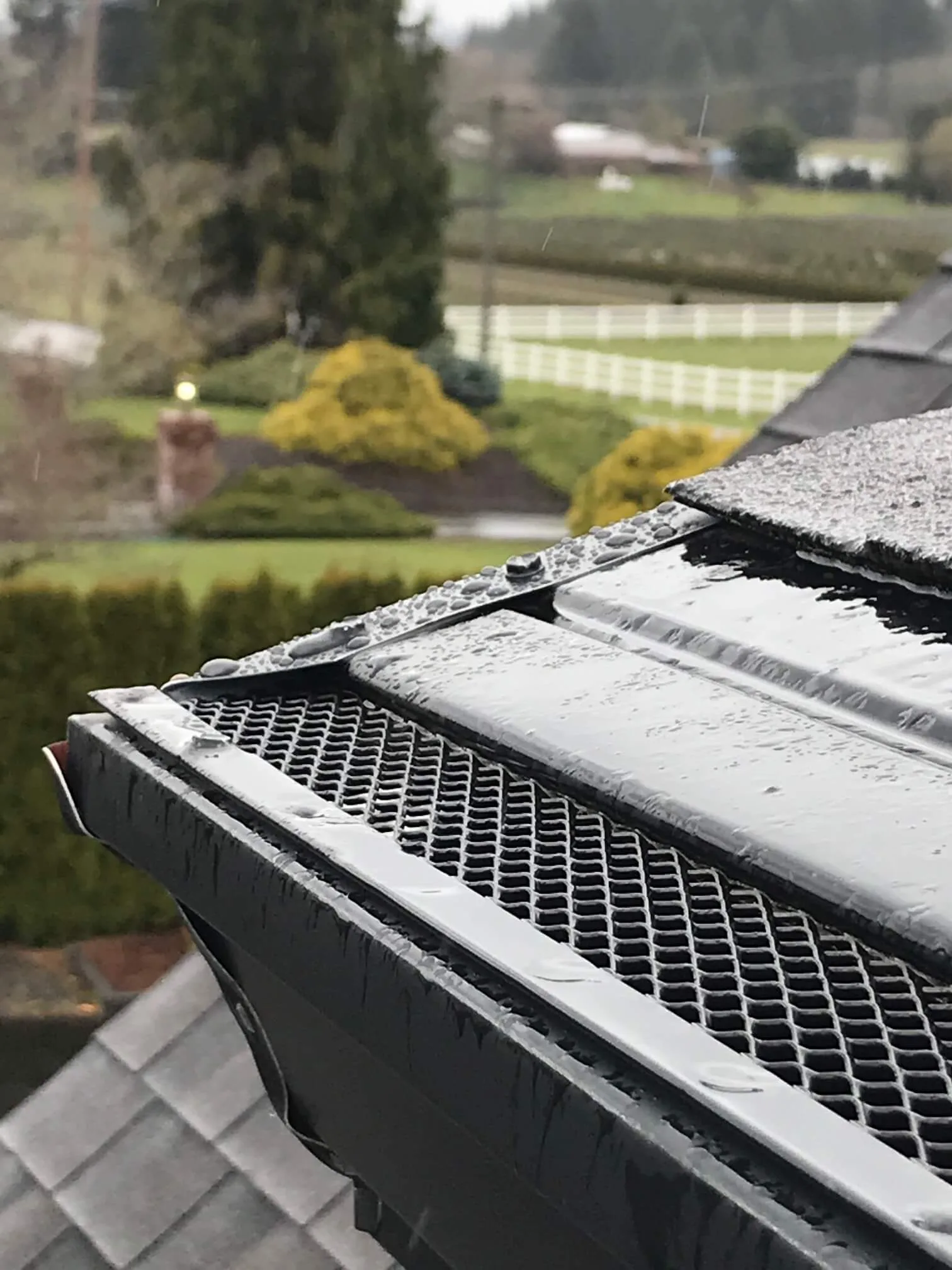Most homeowners assume gutters are a must-have for every house, but that is not always true. Your climate, soil type, roof design, and local building requirements all play a role in whether you actually need them—and understanding these factors could save you money on unnecessary installation.
Some homes function perfectly well without gutters, especially in dry climates or when they have large roof overhangs that naturally direct water away from the foundation. However, most properties do benefit from proper drainage systems, so it is worth understanding when gutters are essential versus when you might be able to skip them.
What are Gutters for?
Most homeowners see gutters as just another part of their home’s exterior, but these simple channels serve as your property’s first line of defense against water damage. When rain hits your roof, it needs somewhere to go, and without gutters, that water cascades directly off roof edges like a waterfall, creating problems that extend far beyond a few puddles. Gutters collect this runoff and direct it through a controlled system of downspouts, ensuring water flows away from your home rather than pooling where it can cause serious damage.
The most critical function of gutters is foundation protection. When water pours directly from your roof onto the ground around your foundation, it saturates the soil and creates hydrostatic pressure against foundation walls. Over time, this pressure can cause cracks, leaks, and even structural settling. Professionally installed gutters with adequate downspout extensions move water at least six feet away from your foundation, maintaining the stable soil conditions your home needs while preventing basement flooding and moisture problems in crawl spaces.
Gutters also preserve your home’s exterior surfaces and landscaping investment. Without them, rainwater streams down exterior walls, seeping into small cracks and gaps where it causes wood rot, paint deterioration, and siding damage. Meanwhile, uncontrolled roof runoff creates erosion channels that wash away soil, mulch, and plants, undermining walkways and creating unsightly gullies in your yard. By capturing runoff before it can flow down walls or pound the ground, gutters protect both your home’s appearance and your outdoor spaces.
While gutters may seem like a simple addition to your home, they perform complex water management functions that protect your property from multiple types of costly damage. Regular gutter maintenance, including gutter cleaning and inspection, ensures these systems continue protecting your investment. When gutters function properly, they prevent problems that could cost thousands of dollars to repair, making them one of the most cost-effective home protection systems available.
When Gutters May Not Be Necessary
While gutters provide essential protection for most homes, certain situations exist where they may not be required or could even be problematic. Understanding these exceptions can help homeowners make informed decisions about their water management needs and avoid unnecessary installations in specific circumstances.
Homes in extremely arid climates with minimal annual rainfall may not require gutters, particularly if the property sits on well-draining soil with significant distance from neighboring structures. In these dry regions, the rare precipitation events do not generate enough runoff to justify the installation and maintenance costs. Additionally, homes with extensive roof overhangs that extend several feet beyond the foundation can naturally direct water away from the structure, reducing the need for gutter systems in moderate climates.
Certain architectural styles and site conditions also eliminate gutter necessity. Homes built on steep slopes with excellent natural drainage may channel water away effectively without gutters, especially when combined with proper landscaping and grading. Similarly, properties with concrete aprons or extensive hardscaping around the foundation perimeter may already have adequate water diversion systems in place. Some modern architectural designs intentionally omit gutters for aesthetic reasons while incorporating alternative drainage solutions like French drains or specialized roof designs.
However, most residential properties benefit from gutters regardless of climate or design. Even in situations where gutters seem unnecessary, changing weather patterns, landscaping modifications, or neighboring construction can alter drainage conditions over time. Before deciding to forgo gutters, homeowners should consult with drainage professionals to assess their specific situation and consider long-term property protection needs.
When Gutters are Necessary
Gutters become essential for homes in regions with regular rainfall, snow, or storm activity where water management poses a real threat to property integrity. Any home receiving more than 20 inches of annual precipitation should have gutters to handle seasonal runoff and protect against water damage. Areas prone to heavy downpours, ice storms, or rapid snowmelt create conditions where uncontrolled roof runoff can quickly overwhelm natural drainage and cause foundation problems, making gutters a critical investment rather than an optional upgrade.
Foundation proximity and soil conditions make gutters mandatory in many residential settings. Homes built on clay soil, which expands and contracts with moisture changes, require gutters to maintain consistent soil conditions around the foundation. Properties with basements or crawl spaces need gutters to prevent water infiltration that leads to mold, structural damage, and costly repairs. Additionally, homes built close to property lines or neighboring structures must use gutters to prevent water from flowing onto adjacent properties, which can create legal issues and neighborly disputes.
Architectural features and landscaping investments also dictate gutter necessity. Homes with minimal roof overhangs, steep roof pitches, or multiple roof levels concentrate water flow into specific areas, requiring gutters to distribute runoff safely. Properties with established landscaping, walkways, or driveways near the foundation need gutters to protect these investments from erosion and water damage. Multi-story homes and those with dormers or complex rooflines create concentrated water flow that can damage siding, windows, and exterior surfaces without proper gutter systems.
Building codes and insurance requirements increasingly mandate gutters for new construction and major renovations in many areas. Local regulations often require gutters in regions with specific climate conditions or soil types, making them legally necessary rather than optional. Homeowners insurance policies may also require proper drainage systems, including gutters, to maintain coverage for water damage claims, making gutters both a protective measure and a financial necessity for most residential properties.
FAQ’s: Gutter Necessity
Our most frequently asked questions regarding the necessity of gutters on homes.
What types of homes can do without gutters?
Homes in arid climates with less than 20 inches of annual rainfall can typically do without gutters, especially if they feature extensive roof overhangs (3+ feet) that naturally direct water away from the foundation. Single-story homes built on well-draining sandy soil with significant distance from property lines and neighboring structures may also function without gutters, particularly when combined with proper grading that slopes away from the foundation. Some modern architectural designs intentionally omit gutters while incorporating alternative drainage solutions like French drains or specialized roof configurations, though these represent exceptions rather than the norm. However, most residential properties benefit from gutters regardless of climate or design, as changing weather patterns and site conditions can alter drainage needs over time.
How do I know if my house needs gutters?
Your house needs gutters if you live in an area with more than 20 inches of annual rainfall, have a basement or crawl space, or notice water pooling around your foundation after storms. Signs that indicate gutter necessity include soil erosion near your home’s perimeter, water stains on siding or foundation walls, basement moisture problems, or damaged landscaping from roof runoff. Homes with minimal roof overhangs (less than 2 feet), steep roof pitches, clay soil, or close proximity to neighboring properties typically require gutters for proper water management. If you are experiencing foundation settling, paint peeling on exterior walls, or ice dams in winter, these are strong indicators that your home would benefit from a gutter system to control water flow and protect your property investment.
What are the consequences of not having gutters?
Not having gutters can lead to serious and costly property damage, including foundation cracks, basement flooding, and structural settling caused by water pooling around your home’s perimeter. Without gutters, roof runoff creates soil erosion that damages landscaping, undermines walkways and driveways, and can wash away expensive plants and mulch. Water cascading directly from your roof also causes exterior damage such as wood rot, paint deterioration, siding stains, and window frame deterioration, while potentially creating ice dams in winter that can damage your roof and interior. Additionally, uncontrolled water flow can lead to basement moisture problems, mold growth, and crawl space issues that compromise indoor air quality and require expensive remediation, making the absence of gutters a significant threat to both your property value and your family’s health.
Transform Your Home’s Protection with DaBella Gutter Solutions
DaBella specializes in comprehensive gutter replacement that goes beyond basic water management to deliver complete home protection systems.
Premium Gutters & Gutter Cover Systems Built to Last
Our premier gutter installations feature heavy-duty materials engineered for your specific climate conditions.. Each installation includes precision measurements, professional-grade fasteners, and weatherproof sealing techniques that ensure long-term durability. We back our work with comprehensive warranties because we believe in the quality of our craftsmanship.
DaBella’s innovative gutter cover systems keep debris out while maintaining optimal water flow, reducing maintenance costs and eliminating safety risks associated with ladder work. These covers handle everything from pine needles to heavy leaf fall without clogging or requiring seasonal adjustments.
Your Home Deserves Professional Protection
Foundation damage, landscape erosion, and exterior deterioration costs thousands in repairs. Investing in quality gutters now prevents these expensive problems while boosting your property’s value and curb appeal.
Get Started Today
Contact DaBella today at 844-DaBella for your complimentary gutter evaluation. Our specialists will assess your home’s specific needs and recommend the ideal gutter solution that delivers decades of reliable protection.


